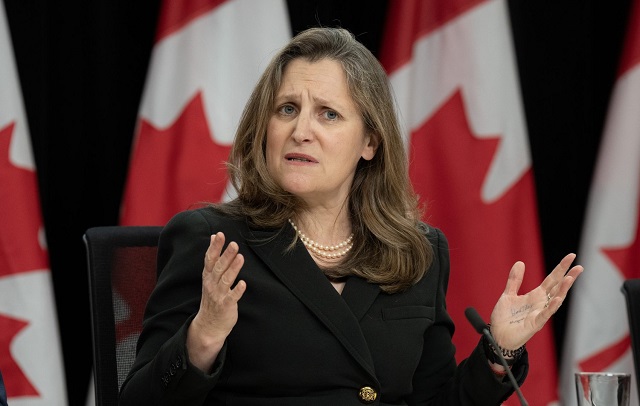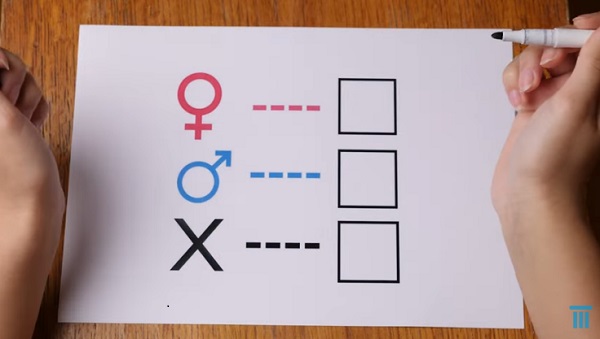Business
For the record—former finance minister did not keep Canada’s ‘fiscal powder dry’

From the Fraser Institute
By Ben Eisen
In case you haven’t heard, Chrystia Freeland resigned from cabinet on Monday. Reportedly, the straw that broke the camel’s back was Prime Minister Trudeau’s plan to send all Canadians earning up to $150,000 a onetime $250 tax “rebate.” In her resignation letter, Freeland seemingly took aim at this ill-advised waste of money by noting “costly political gimmicks.” She could not have been more right, as my colleagues and I have written here, here and elsewhere.
Indeed, Freeland was right to excoriate the government for a onetime rebate cheque that would do nothing to help Canada’s long-term economic growth prospects, but her reasoning was curious given her record in office. She wrote that such gimmicks were unwise because Canada must keep its “fiscal powder dry” given the possibility of trade disputes with the United States.
Again, to a large extent Freeland’s logic is sound. Emergencies come up from time to time, and governments should be particularly frugal with public dollars during non-emergency periods so money is available when hard times come.
For example, the federal government’s generally restrained approach to spending during the 1990s and 2000s was an important reason Canada went into the pandemic with its books in better shape than most other countries. This is an example of how keeping “fiscal powder dry” can help a government be ready when emergencies strike.
However, much of the sentiment in Freeland’s resignation letter does not match her record as finance minister.
Of course, during the pandemic and its immediate aftermath, it’s understandable that the federal government ran large deficits. However, several years have now past and the Trudeau government has run large continuous deficits. This year, the government forecasts a $48.3 billion deficit, which is larger than the $40 billion target the government had previously set.
A finance minister committed to keeping Canada’s fiscal powder dry would have pushed for balanced budgets so Ottawa could start shrinking the massive debt burden accumulated during COVID. Instead, deficits persisted and debt has continued to climb. As a result, federal debt may spike beyond levels reached during the pandemic if another emergency strikes.
Minister Freeland’s reported decision to oppose the planned $250 onetime tax rebates is commendable. But we should be cautious not to rewrite history. Despite Freeland’s stated desire to keep Canada’s “fiscal powder dry,” this was not the story of her tenure as finance minister. Instead, the story is one of continuous deficits and growing debt, which have hurt Canada’s capacity to withstand the next fiscal emergency whenever it does arrive.
2025 Federal Election
Alcohol tax and MP pay hike tomorrow (April 1)

The Canadian Taxpayers Federation is calling on all party leaders to stop a pair of bad policies that are scheduled to happen automatically on April 1: pay raises for members Parliament and another alcohol tax increase.
“Party leaders owe taxpayers answers to these two questions: Why do you think you deserve a pay raise and why should Canadians pay higher taxes on beer and wine?” said Franco Terrazzano, CTF Federal Director. “Politicians don’t deserve a raise while millions of Canadians are struggling.
“And the last thing Canadians need is another tax hike when they pour a cold one or uncork a bottle with that special someone.”
MPs give themselves pay raises each year on April 1, based on the average annual increase in union contracts with corporations with 500 or more employees.
The CTF estimates tomorrow’s pay raise will amount to an extra $6,200 for backbench MPs, $9,200 for ministers and $12,400 for the prime minister, based on contract data published by the federal government.
After tomorrow’s pay raise, backbench MPs will receive a $209,300 annual salary, according to CTF estimates. A minister will collect $309,100 and the prime minister will take home $418,600.
Meanwhile, the alcohol escalator automatically increases excise taxes on beer, wine and spirits every year on April 1, without a vote in Parliament. Alcohol taxes will increase by two per cent tomorrow, costing taxpayers about $40 million this year, according to Beer Canada estimates.
The alcohol escalator tax has cost taxpayers more than $900 million since it was imposed in 2017, according to Beer Canada estimates.
“Politicians are padding their pockets on the same day they’re raising beer taxes and that’s wrong,” Terrazzano said. “If party leaders want to prove they care about taxpayers, they should stop the MP pay raises.
“And if party leaders care about giving Canadian brewers, distillers and wineries a fighting chance against tariffs, it’s time to stop hitting them with alcohol tax hikes year after year.”
The CTF released Leger polling showing 79 per cent of Canadians oppose tomorrow’s MP pay raise.
2025 Federal Election
Poilievre To Create ‘Canada First’ National Energy Corridor

From Conservative Party Communications
Poilievre will create the ‘Canada First’ National Energy Corridor to rapidly approve & build the infrastructure we need to end our energy dependence on America so we can stand up to Trump from a position of strength.
Conservative Leader Pierre Poilievre announced today he will create a ‘Canada First’ National Energy Corridor to fast-track approvals for transmission lines, railways, pipelines, and other critical infrastructure across Canada in a pre-approved transport corridor entirely within Canada, transporting our resources within Canada and to the world while bypassing the United States. It will bring billions of dollars of new investment into Canada’s economy, create powerful paycheques for Canadian workers, and restore our economic independence.
“After the Lost Liberal decade, Canada is poorer, weaker, and more dependent on the United States than ever before,” said Poilievre. “My ‘Canada First National Energy Corridor’ will enable us to quickly build the infrastructure we need to strengthen our country so we can stand on our own two feet and stand up to the Americans.”
In the corridor, all levels of government will provide legally binding commitments to approve projects. This means investors will no longer face the endless regulatory limbo that has made Canadians poorer. First Nations will be involved from the outset, ensuring that economic benefits flow directly to them and that their approval is secured before any money is spent.
Between 2015 and 2020, Canada cancelled 16 major energy projects, resulting in a $176 billion hit to our economy. The Liberals killed the Energy East pipeline and passed Bill C-69, the “No-New-Pipelines” law, which makes it all but impossible to build the pipelines and energy infrastructure we need to strengthen the Canadian economy. And now, the PBO projects that the ‘Carney cap’ on Canadian energy will reduce oil and gas production by nearly 5%, slash GDP by $20.5 billion annually, and eliminate 54,400 full-time jobs by 2032. An average mine opening lead time is now nearly 18 years—23% longer than Australia and 38% longer than the US. As a result of the Lost Liberal Decade, Canada now ranks 23rd in the World Bank’s Ease of Doing Business Index for 2024, a seven-place drop since 2015.
“In 2024, Canada exported 98% of its crude oil to the United States. This leaves us too dependent on the Americans,” said Poilievre. “Our Canada First National Energy Corridor will get us out from under America’s thumb and enable us to build the infrastructure we need to sell our natural resources to new markets, bring home jobs and dollars, and make us sovereign and self-reliant to stand up to Trump from a position of strength.”
Mark Carney’s economic advice to Justin Trudeau made Canada weaker while he and his rich friends made out like bandits. While he advised Trudeau to cancel Canadian energy projects, his own company spent billions on pipelines in South America and the Middle East. And unlike our competitors Australia and America, which work with builders to get projects approved, Mark Carney and Steven Guilbeault’s radical “keep-it-in-the-ground” ideology has blocked development, killed jobs, and left Canada dependent on foreign imports.
“The choice is clear: a fourth Liberal term that will keep our resources in the ground and keep us weak and vulnerable to Trump’s threats, or a strong new Conservative government that will approve projects, build an economic fortress, bring jobs and dollars home, and put Canada First—For a Change.”
-

 Uncategorized1 day ago
Uncategorized1 day agoPoilievre on 2025 Election Interference – Carney sill hasn’t fired Liberal MP in Chinese election interference scandal
-

 Business2 days ago
Business2 days agoCuba has lost 24% of it’s population to emigration in the last 4 years
-

 2025 Federal Election1 day ago
2025 Federal Election1 day ago2025 Election Interference – CCP Bounty on Conservative Candidate – Carney Says Nothing
-

 2025 Federal Election1 day ago
2025 Federal Election1 day ago2025 Federal Election Interference from China! Carney Pressed to Remove Liberal MP Over CCP Bounty Remark
-

 2025 Federal Election16 hours ago
2025 Federal Election16 hours agoChinese Election Interference – NDP reaction to bounty on Conservative candidate
-

 2025 Federal Election6 hours ago
2025 Federal Election6 hours agoChina Election Interference – Parties Received Security Briefing Days Ago as SITE Monitors Threats to Conservative Candidate Joe Tay
-

 Aristotle Foundation2 days ago
Aristotle Foundation2 days agoCanada has the world’s MOST relaxed gender policy for minors
-

 International2 days ago
International2 days agoTrump signs executive order to make Washington D.C. “safe and beautiful”







